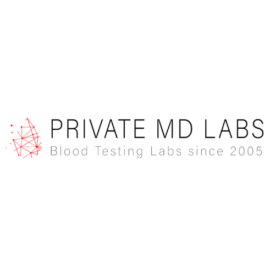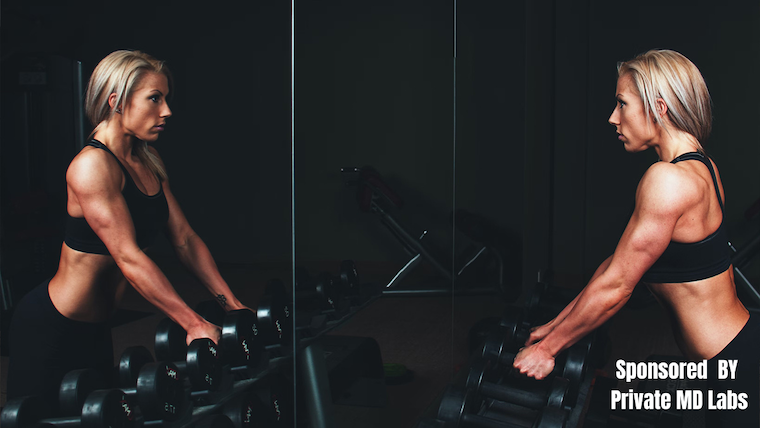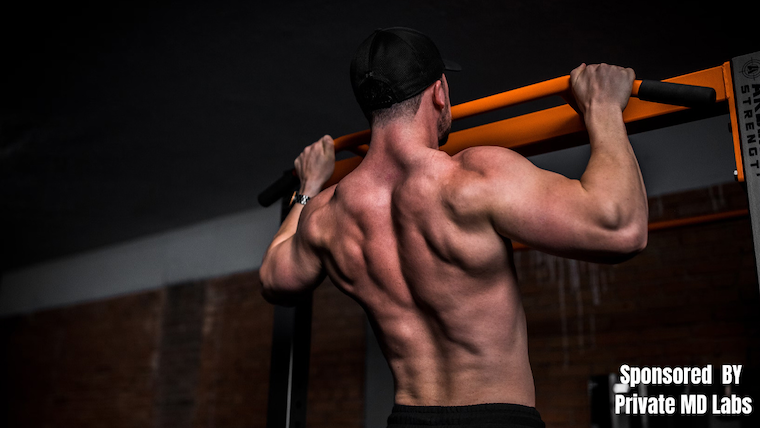Do you want to take your strength training to the next level? Are you trying to pack on muscle mass and eclipse the physique of your current self, morphing yourself into the aesthetic figure of your mind’s eye? The answer may be yes.
And yet, despite training hard in the gym via consistent and high-intensity workouts with a focus on progressive overload, which the Journal of Strength and Conditioning Research suggests can be effective for muscle hypertrophy, you might be trudging through an endless plateau. So what should you do? (1)
While the answer is far from simple and unlikely to be any singular thing, one possible solution to the problem of elusive gains might be a Private MD Labs Bodybuilder blood test.

Private MD Labs Bodybuilder blood test measures testosterone, insulin, lipid profile, thyroid profile, blood count, metabolic panel and more.
Editor’s Note: The content on BarBend is meant to be informative in nature, but it should not be taken as medical advice. When starting a new training regimen and/or diet, it is always a good idea to consult with a trusted medical professional. We are not a medical resource. The opinions and articles on this site are not intended for use as diagnosis, prevention, and/or treatment of health problems. They are not substitutes for consulting a qualified medical professional.
First…What is Private MD Labs?
Private MD Labs is a company that provides state-of-the-art direct access testing, also known as patient-requested testing. The Private MD Labs business model allows individuals to initiate research into specific areas of their health and wellness without a referral from a physician.
Through Private MD Labs, patients request specific tests and pay for them online. Next, they visit one of the company’s 4,000 affiliate clinics for sample collection. After the tests are complete, the secure, encrypted results are posted online. There’s no need to involve an employer or health insurance company (although it is reimbursable with HSA and FSA accounts).

While there aren’t many studies available on the efficacy and success of self-administered blood testing for bodybuilders, some support shows participants who “self-administered tests…generally can properly perform home tests, obtain accurate results, and correctly interpret the results.” (2)
Private MD’s Bodybuilder Blood Test
If that sounds like a good deal, here’s what Private MD’s bodybuilder blood tests (read: hormone panel testing) include, per their website:
- Testosterone, free and total
- Estradiol
- Insulin-Like Growth Factor-1 (IGF-1)
- Complete Blood Count (CBC)
- WBC, RBC, Hemoglobin, Hematocrit, MCV, MCH, MCHC, RDW, Platelet Count, MPV, and Differential (Absolute and Percent — Neutrophils, Lymphocytes, Monocytes, Eosinophils, and Basophils)
- Comprehensive Metabolic Panel (CMP)
- Albumin, Albumin/Globulin Ratio (calculated), Alkaline Phosphatase, ALT, AST, BUN/Creatinine Ratio (calculated), Calcium, Carbon Dioxide, Chloride, Creatinine with GFR Estimated, Globulin (calculated), Glucose, Potassium, Sodium, Total Bilirubin, Total Protein, Urea Nitrogen
- Prostate-Specific Antigen
- Thyroid profile
- T3 Uptake; T4 (Thyroxine), Total; Free T4 Index (T7); Thyroid-Stimulating Hormone (TSH)
- Lipid profile
- Cholesterol, total; high-density lipoprotein (HDL) cholesterol; low-density lipoprotein (LDL) cholesterol (calculated); triglycerides; Non-HDL Cholesterol (calculated)
Why Get a Blood Test?
Arguably the most valuable benefit of getting one’s blood work done is information. A bodybuilder knowing if they are deficient in anything, and by how much, helps them isolate a solution to find balance. These findings (and solutions) could impact energy levels, muscle growth, and a bevy of other aspects that could impact your training.
Additionally, knowing what each aspect of a blood test is for is also essential. According to the journal Health Expectations, a mismatch in understanding between a patient and a physician regarding blood levels could lead to “downstream consequences” during the “decision-making” process following diagnosis. (3)

Below is a brief summary of measurements included in Private MD’s Bodybuilder Blood Test is:
Testosterone
Sports Medicine says testosterone is “the most potent naturally secreted androgenic-anabolic hormones.” It improves body composition by reducing body fat mass, increasing lean body mass, and by increasing epidermal thickness. “In muscle, testosterone stimulates protein synthesis (anabolic effect) and inhibits protein degradation (anti-catabolic effect).” (4)(5)
Estradiol
Estradiol is the most potent estrogen in the human body. It “is a hormone made naturally in the human body by the ovaries. It is crucial in regulating the menstrual cycle, cardiovascular system, neurologic system, skeletal system, and vascular system.” (6)
IGF-1
“IGF-1 is a growth hormone, mediating the protein anabolic and linear growth-promoting effect of pituitary growth hormone.” “It is part of a wide network of growth factors, receptors, and binding proteins involved in mediating cellular proliferation, differentiation, and apoptosis (cell death).” (7)(8)
Blood of a Bodybuilder
Trying to build muscle without hard work is a fool’s errand. However, sometimes working hard isn’t enough. Sometimes working smarter is the key to progress. If you’re ready to start working smarter, order your Private MD Labs Bodybuilder Blood Test today.

Private MD Labs Bodybuilder blood test measures testosterone, insulin, lipid profile, thyroid profile, blood count, metabolic panel and more.
References
- Nóbrega, S., Scarpelli, M., Barcelos, C., Chaves, T., & Libardi, C. (2022). Muscle Hypertrophy Is Affected by Volume Load Progression Models. Journal Of Strength And Conditioning Research, Publish Ahead of Print. doi: 10.1519/jsc.0000000000004225
- Ibitoye, M., Frasca, T., Giguere, R., & Carballo-Diéguez, A. (2014). Home testing past, present and future: lessons learned and implications for HIV home tests. AIDS and behavior, 18(5), 933–949. https://doi.org/10.1007/s10461-013-0668-9
-
Watson, J., Whiting, P. F., Salisbury, C., Hamilton, W. T., & Banks, J. (2022). Blood tests in primary care: A qualitative study of communication and decision-making between doctors and patients. Health expectations : an international journal of public participation in health care and health policy, 25(5), 2453–2461. https://doi.org/10.1111/hex.13564
-
Vingren, J. L., Kraemer, W. J., Ratamess, N. A., Anderson, J. M., Volek, J. S., & Maresh, C. M. (2010). Testosterone physiology in resistance exercise and training: the up-stream regulatory elements. Sports medicine (Auckland, N.Z.), 40(12), 1037–1053. https://doi.org/10.2165/11536910-000000000-00000
-
Köhn F. M. (2006). Testosterone and body functions. The aging male : the official journal of the International Society for the Study of the Aging Male, 9(4), 183–188. https://doi.org/10.1080/13685530601060396
-
Hariri, L., & Rehman, A. (2022). Estradiol. Statpearls Publishing. Retrieved from https://www.ncbi.nlm.nih.gov/books/NBK549797/
-
Laron Z. (2001). Insulin-like growth factor 1 (IGF-1): a growth hormone. Molecular pathology : MP, 54(5), 311–316. https://doi.org/10.1136/mp.54.5.311
-
Bailes, J., & Soloviev, M. (2021). Insulin-Like Growth Factor-1 (IGF-1) and Its Monitoring in Medical Diagnostic and in Sports. Biomolecules, 11(2), 217. https://doi.org/10.3390/biom11020217